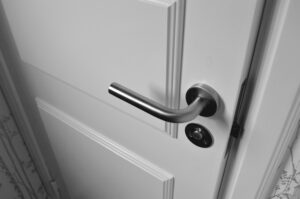
As our lives get busier, automating various tasks or routines becomes not only convenient and comfortable but transformative. It’s no wonder smart homes and home assistants are becoming such integrated aspects of our lives. Unfortunately, this increased automation can also make us more vulnerable to hackers. That means that when it comes to home security, we not only need to look at physical aspects (e.g., lighting, locks, and sensors), we also need to look at security for smart devices that control lights, cameras, thermostats, locks, and so much more.
Types of Home Security Systems
There are two common types of security systems: wired and wireless. Both of which have their pros and cons.
Wired systems, for instance, are more expensive to install and can be more cumbersome to hide as they’re connected via wires. However, they’re also less susceptible to being hacked.
Wireless systems, on the other hand, use radio waves to communicate information between control panels, sensors, cameras, and other devices. This allows greater freedom as the entire system can be controlled from your personal device. However, that also means you’ll want improved security for smart devices to protect against hackers who can interfere with, manipulate, and tamper with your system if they gain access.

Improving Security for Smart Devices
There are simple steps you can take as a consumer to help protect your smart devices and provide greater security against hackers. Start with your router and ensure you:
- Use secure passwords that are difficult to guess. Avoid using “password,” a series of numbers (e.g., 123456), phone numbers, and family birthdays, for instance. Instead, choose a long, random phrase with numbers, symbols, and different cases, so the password is difficult to guess. You’ll also want to change the password from the default password that comes with the device. To make it easier to keep track of your passwords, set up a password manager.
- Personalize passwords for each smart device, and change the passwords on a regular schedule. (For instance, update your passwords at least yearly and preferably twice a year or quarterly for your most sensitive devices.)
- Only share passwords with people you trust completely. And change passwords immediately if that trust is broken.
- Enable encryption on your devices, including your WiFi router, so only authorized devices (and people) can access the information.
- Keep your firmware updated as companies update security for known or upcoming risks or vulnerabilities. If possible, set your router and devices to update automatically. If not, create reminders to visit the manufacturer’s website regularly for updates.
- Double-check your security settings. Newer routers come with WPA3 or WAP2 settings. Use these settings for greater security. If you have an older router with a WEP or WPA setting, it’s time to upgrade for greater security.
- Disable features or apps you don’t use, such as Universal Plug and Play (UPnP), which can allow an entry point for potential hackers.
Next, take a look at your security cameras. Unfortunately, DIY camera installations can open you up to hackers who can see what your cameras record.
- Don’t connect your cameras to your home WiFi. Instead, use an app-based camera system, which has a lower risk of being hacked.
- Install firmware updates for your security cameras as well.
- Update the cameras’ passwords and ensure it’s different from the router’s password.
- Enable two-factor authentication on all of your devices. Even if a hacker guesses your password, they can’t get in without your code, which adds one more layer of protection. These are especially important for cameras, smart locks, and doorbells to keep your home safe.
Smart Locks are so convenient. You can let trusted people into your home even when you aren’t there (such as a family member, friend, or dog sitter). You can also easily “change the locks” if you no longer want someone to have access. You can give each family member their own unique code, so you know who’s coming and going and when. Naturally, to keep out unwanted guests, especially intruders, you’ll want to keep your smart devices secure.
Password security—ones that are difficult to guess—is the best way to secure your smart devices and keep potential hackers out of the system. Additionally, you can use encryption to further protect smart locks.
Anytime you add a wireless device to your home, enhance the security by:
- Registering the device with the manufacturer and setting it up for security software updates to protect against vulnerabilities.
- Review permissions and only share data you’re comfortable sharing. Look beyond the default settings, which may allow greater access than you’re comfortable with.
- Ask for professional help: professionals can help provide guidance with your security system or even do the installation. They know what to look for when connecting smart devices securely. They can also answer questions and run through how to use the technology.
- Protect devices that are always “on,” as they can be more vulnerable to hackers. You can change the settings, so they turn off automatically or increase restrictions. Or, you can unplug them when they aren’t in use.
- Protect your privacy by keeping some rooms, such as your bedrooms, device free.
- Reset your devices to factory settings before selling, recycling, or throwing away—this includes old phones, tablets, computers, printers, and other devices that could potentially still communicate with your home devices.
ADT (now Telus) takes your system’s safety seriously. We continually reevaluate our best practices to keep up-to-date with the ever-changing world of smart device security. For instance, the Mobile App is set up so it won’t work on “jailbroken” devices, which have more vulnerable operating system codes. This reduces the risk of malware, viruses, spyware, and other potentially harmful software.
We also use the latest encryption, so your devices effectively share information to keep your home safe while protecting it from outside influences.

Security for Smart Devices
Setting up smart home devices can help keep your home more comfortable, safe, and even save you money. An ADT (now Telus) monitored alarm system from Alarm Guard provides added security for you, your property, your family, and your devices. Plus, it could help you save on homeowner’s insurance! Check out our packages and call now for a free quote at 1-855-518-4458 and talk with an expert about a customized package to protect your home and keep your devices safe and secure.
